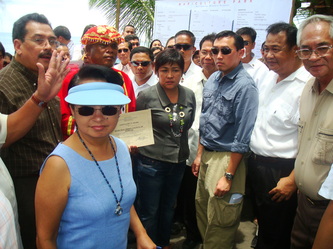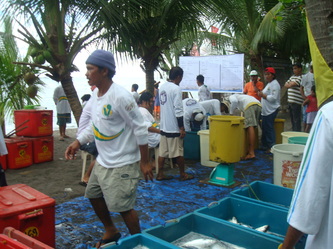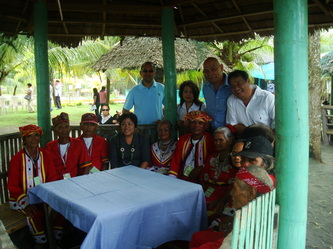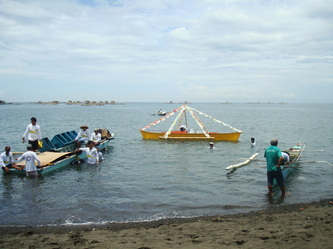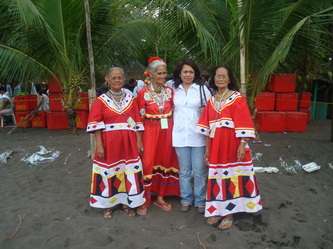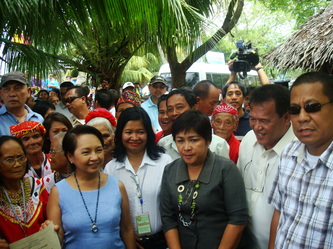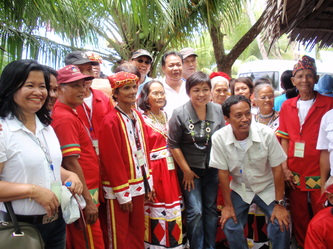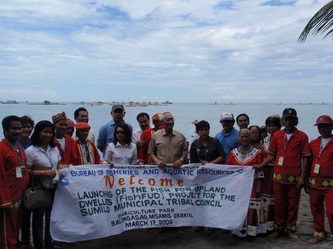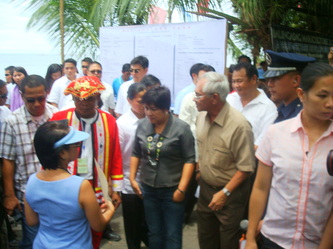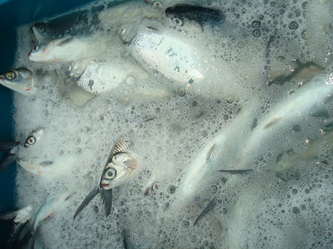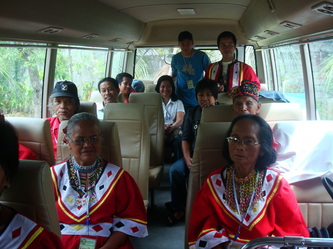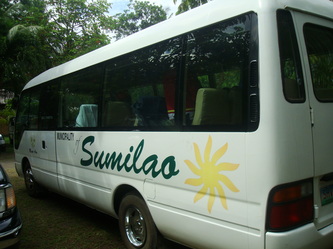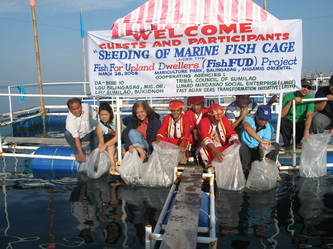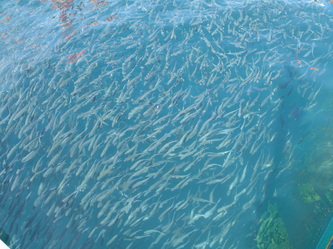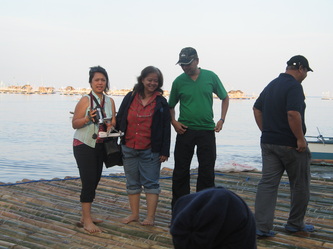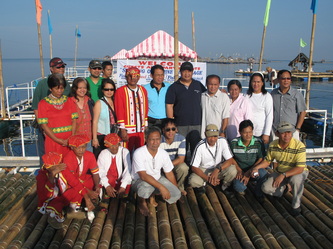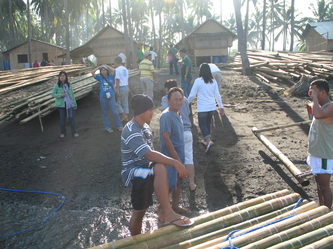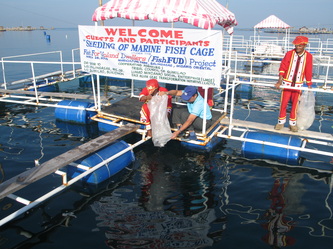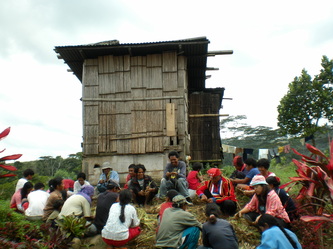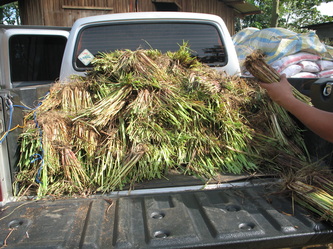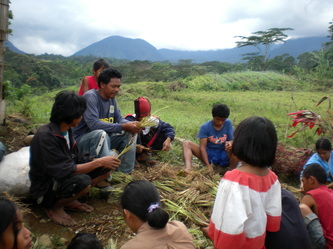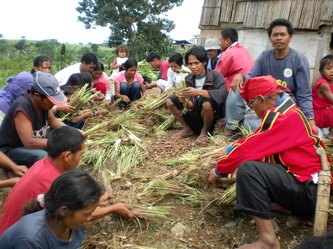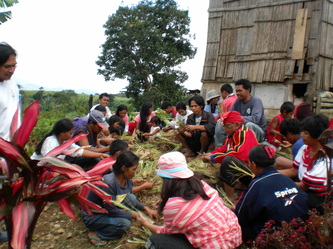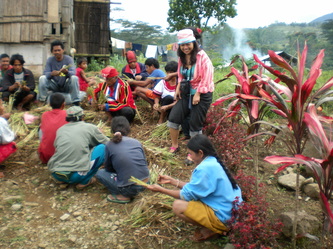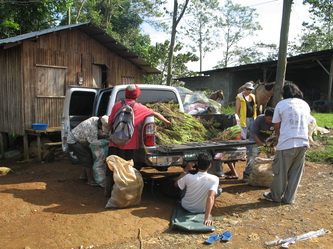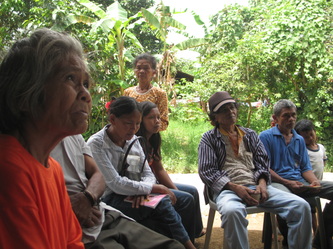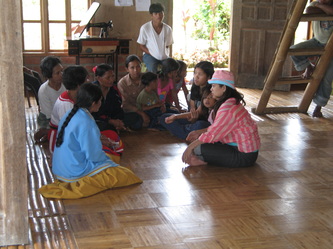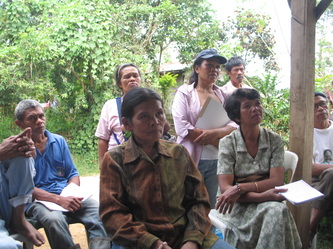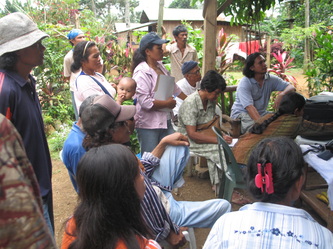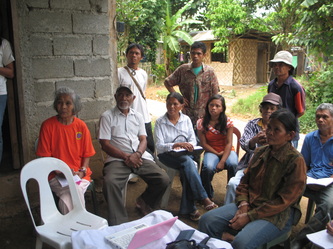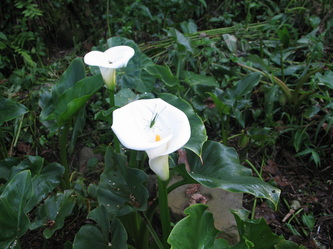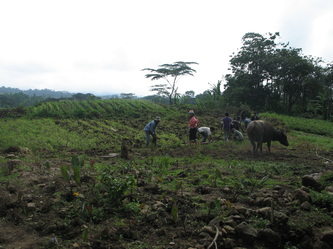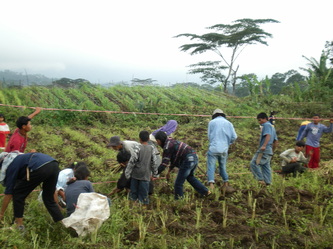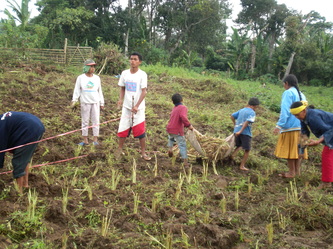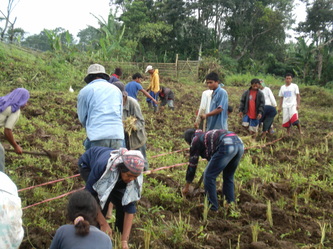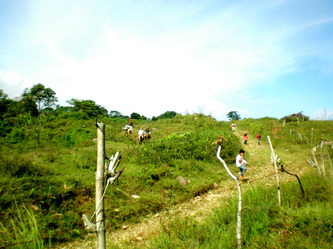GreenMinded Initiatives
Fish for Upland Dwellers (FishFUD)
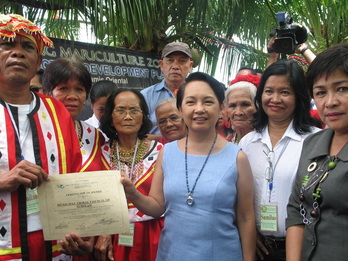
Soup of the Day (SOD) is our entry point to communicate the initiative we are trying to accomplish. Because of the SOD-QOS insights, we have evolved and entered the world we once thought of as only a field of dreams. A field wherein only we can see but we were wronged. This field of dreams is for real and together with the people who believe in the concept, we are making it a reality to spell the difference.
Helping the needy through a mechanism that is acceptable with the haves is something to think out of the box. We have to be creative but very effective. No false hope, no hidden motives and most of all no DOLE OUT. With this thought, fishFUD (Food for Upland Dwellers) was born. Anchored with the ridge to reef connection, we come up with a business idea, a micro enterprise approach where the fish farmers and the Indegenous Peoples in Mt. Kitanglad are the key players. The Department of Agriculture through its BFAR Mariculture Farm in Balingasag CDO, Malaybalay LGUs, DENR, PMBI, Xavier Estate Research Studies, Sambdhana Institute and Kitanglad Integrated NGOs (KIN) with us the Project Management Team are one in this direction, making it a reality.
Corporate social responsibilities is hard enough to pound in the heads of the “Haves” in the real sense of the word. Most corporations have been seeking ways to go around this and use it for their own financial advantage and benefits. What our vision on this is that they treat “social responsibilities” as real social responsibilities not as a buzz word and feel good thing for the “haves” consciences. People in the coastal areas using the eco-services of the marine habitat do not at present care of what happens in the forest regions if they do not get affected as we are mostly use to being reactive to situations and will only act when we encounter problems.
The perception of the lowlanders that they have to give a dole out because their brothers the upland dwellers are lazy and untrustworthy as this is a prevalent train of thoughts at present and this needs to be change. We need to prove and change this perception to upland dwellers being responsible and industrious. We need to show the lowlanders that even for food our bothers in the upland works for it and at the same time protect the forest that will affect the livelihood of the lowland people. There is also a perception that most NGO’s just extend their hands for grants and when they get grants only thick reports passing a paper weight test is produce with no visual real economic empowerment felt by the beneficiaries. This too has to change and I see KIN as the catalyst for this to change. THIS MUST BE EMPHASIZE AND THIS MUST BE DONE BY EXAMPLES.
FUD is just our stepping stone for bigger projects. We need a model badly and this is the model and since the National Government is now reaching out and willing to help we need to take advantage of this and KIN must move on this fast.
We have entered the field where dreams can be real. People together in one direction will achieve the goal, proving once again good intention powered with joint effort to make it real will move mountains adjoining it to the ocean that once has never given thought of its connectivity.
Helping the needy through a mechanism that is acceptable with the haves is something to think out of the box. We have to be creative but very effective. No false hope, no hidden motives and most of all no DOLE OUT. With this thought, fishFUD (Food for Upland Dwellers) was born. Anchored with the ridge to reef connection, we come up with a business idea, a micro enterprise approach where the fish farmers and the Indegenous Peoples in Mt. Kitanglad are the key players. The Department of Agriculture through its BFAR Mariculture Farm in Balingasag CDO, Malaybalay LGUs, DENR, PMBI, Xavier Estate Research Studies, Sambdhana Institute and Kitanglad Integrated NGOs (KIN) with us the Project Management Team are one in this direction, making it a reality.
Corporate social responsibilities is hard enough to pound in the heads of the “Haves” in the real sense of the word. Most corporations have been seeking ways to go around this and use it for their own financial advantage and benefits. What our vision on this is that they treat “social responsibilities” as real social responsibilities not as a buzz word and feel good thing for the “haves” consciences. People in the coastal areas using the eco-services of the marine habitat do not at present care of what happens in the forest regions if they do not get affected as we are mostly use to being reactive to situations and will only act when we encounter problems.
The perception of the lowlanders that they have to give a dole out because their brothers the upland dwellers are lazy and untrustworthy as this is a prevalent train of thoughts at present and this needs to be change. We need to prove and change this perception to upland dwellers being responsible and industrious. We need to show the lowlanders that even for food our bothers in the upland works for it and at the same time protect the forest that will affect the livelihood of the lowland people. There is also a perception that most NGO’s just extend their hands for grants and when they get grants only thick reports passing a paper weight test is produce with no visual real economic empowerment felt by the beneficiaries. This too has to change and I see KIN as the catalyst for this to change. THIS MUST BE EMPHASIZE AND THIS MUST BE DONE BY EXAMPLES.
FUD is just our stepping stone for bigger projects. We need a model badly and this is the model and since the National Government is now reaching out and willing to help we need to take advantage of this and KIN must move on this fast.
We have entered the field where dreams can be real. People together in one direction will achieve the goal, proving once again good intention powered with joint effort to make it real will move mountains adjoining it to the ocean that once has never given thought of its connectivity.
EAT soup, HELP communities, FEED a healthy nation
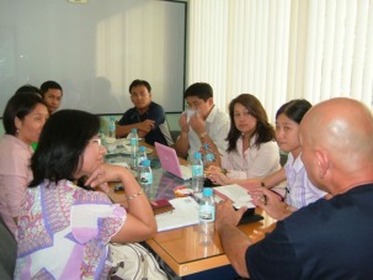
Lemon Grass for Daraghuyan and Pamalihi Tribal Community
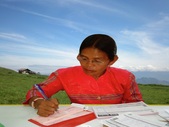
Bae Inatlawan preparing the check for the Daraghuyan lemon grass project, a hands-on realtime training by GreenMinded, Inc. - 10/22/09 by mary jean netario cruz
The lemon grass project is a project that had been identified for the Daraghuyan Tribal Community in Mt. Kitanglad, Malaybalay City. It was conceptualized out of a desire to help the community to be free economically. Mary Jean's journey led her to UP Los Banos, Geox Farms, AIDFI, the Gold in Grass, and other different farms and communities in the Philippines. Looking for technical information, searching for answers to understand and longing to see the realization of this dream. Finally, the Daraghuyan Community planted the first seedling. Samdhana Institute has been instrumental through funding the initial phase of the propagation and distillation machine. Ferdinand Cruz of EASTI made it possible through his expertise on community development. We have just started, but vision is better now that we have started the propagation by 1,000 sqm nursery at the heritage center. Another thousand sqm is to be planted by the tribe as we have completed the first five thousand. Five hectares is the target area planted. Lemon grass is to be planted in areas not use for the vegetables. Six months after, we will start the distillation of lemon grass oil. We will be producing lemon grass concentrate too.
The lemon grass project is envisioned to be rolled out to other communities as part of the Memorandum of Agreement with the GreenMinded, Inc.
Lemon Grass project is another initiative of GreenMinded, Inc. applying the SOD-QOS Principles.
The lemon grass project is a project that had been identified for the Daraghuyan Tribal Community in Mt. Kitanglad, Malaybalay City. It was conceptualized out of a desire to help the community to be free economically. Mary Jean's journey led her to UP Los Banos, Geox Farms, AIDFI, the Gold in Grass, and other different farms and communities in the Philippines. Looking for technical information, searching for answers to understand and longing to see the realization of this dream. Finally, the Daraghuyan Community planted the first seedling. Samdhana Institute has been instrumental through funding the initial phase of the propagation and distillation machine. Ferdinand Cruz of EASTI made it possible through his expertise on community development. We have just started, but vision is better now that we have started the propagation by 1,000 sqm nursery at the heritage center. Another thousand sqm is to be planted by the tribe as we have completed the first five thousand. Five hectares is the target area planted. Lemon grass is to be planted in areas not use for the vegetables. Six months after, we will start the distillation of lemon grass oil. We will be producing lemon grass concentrate too.
The lemon grass project is envisioned to be rolled out to other communities as part of the Memorandum of Agreement with the GreenMinded, Inc.
Lemon Grass project is another initiative of GreenMinded, Inc. applying the SOD-QOS Principles.
Social Optimum Development - Quadrant of Sustainability (SOD-QoS)
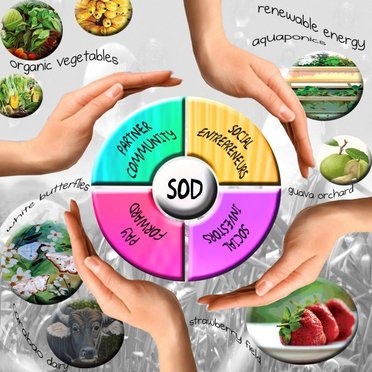
Social Optimum Development Quadrant of Sustainability (SOD-QoS) is a body of business principles adapted to the dynamics and sensibilities of a community based livelihood towards bridging linkages and fostering understanding and acceptance of the immense value it builds towards sustainability. The SOD-QoS is a product of principles and application building sense of ownership, transforming each quadrant to interchange positioning as it bridge leadership and success.
SOD-QoS incorporates visual, emotional, functional and financial tool for sustainable livelihood, a multi-sectoral stakeholders approach anchored on Social Entrepreneurship stream operating for profit.
The Quadrants encompassing the Whole:
1st Quadrant - Partner Community Organization (PCO)
2nd Quadrant - Partner Social Entrepreneurs (PSE)
3rd Quadrant - Partner Social Investors (PSI)
4th Quadrant - Roll Out Seed (ROS)
The SOD-QoS is a very easy to understand and implement core concept and principles guiding the Social Investors (NGOs, Government Organizations , Private Organization of Individuals) who wanted to help empower the disenfranchised members of our society through funding an initiative for profit. The community based livelihood and the people behind the organization will know what is in it for them and what is their responsibilities. The Social Entrepreneurs role and rights are also discussed.
The SOD-QoS is designed to apply to a community based livelihood, a social enterprise conceptualize through the process of a collective understanding, need assessment, participatory planning and specific goals identification of the community, verified and studied for business opportunities by the Social Entrepreneurs and funded by the Social Investors. In summary , the organization has the legal ownership of the business, Social Entrepreneurs Consultants are provided of stipend and honorary fees. The value of their services is accounted for that entitles the 2nd Quadrant to a 25% share in the net profit of the operation. The 3rd Quadrant represents the Social Investors and entitles them for the 25% share in the net income of the social enterprise. In case the Social Investors do not expect to receive their share in the profit, their shares is to be pooled together with the 25% share in the 4th Quadrant called the Roll Out Seed (ROS). This ROS makes the organization the new social investor and if they can roll out the project based on their knowledge and experience gained in their initial social enterprise, they became the Social Entrepreneur Consultant for the roll out project.
SOD-QoS incorporates visual, emotional, functional and financial tool for sustainable livelihood, a multi-sectoral stakeholders approach anchored on Social Entrepreneurship stream operating for profit.
The Quadrants encompassing the Whole:
1st Quadrant - Partner Community Organization (PCO)
2nd Quadrant - Partner Social Entrepreneurs (PSE)
3rd Quadrant - Partner Social Investors (PSI)
4th Quadrant - Roll Out Seed (ROS)
The SOD-QoS is a very easy to understand and implement core concept and principles guiding the Social Investors (NGOs, Government Organizations , Private Organization of Individuals) who wanted to help empower the disenfranchised members of our society through funding an initiative for profit. The community based livelihood and the people behind the organization will know what is in it for them and what is their responsibilities. The Social Entrepreneurs role and rights are also discussed.
The SOD-QoS is designed to apply to a community based livelihood, a social enterprise conceptualize through the process of a collective understanding, need assessment, participatory planning and specific goals identification of the community, verified and studied for business opportunities by the Social Entrepreneurs and funded by the Social Investors. In summary , the organization has the legal ownership of the business, Social Entrepreneurs Consultants are provided of stipend and honorary fees. The value of their services is accounted for that entitles the 2nd Quadrant to a 25% share in the net profit of the operation. The 3rd Quadrant represents the Social Investors and entitles them for the 25% share in the net income of the social enterprise. In case the Social Investors do not expect to receive their share in the profit, their shares is to be pooled together with the 25% share in the 4th Quadrant called the Roll Out Seed (ROS). This ROS makes the organization the new social investor and if they can roll out the project based on their knowledge and experience gained in their initial social enterprise, they became the Social Entrepreneur Consultant for the roll out project.
Health and Nutrition, education with application
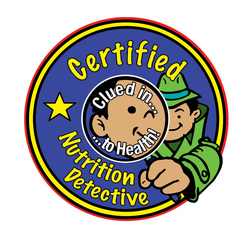
NUTRITION DETECTIVES - PHILIPPINES
Nutrition Detectives is a program developed by Dr. David Katz, now with our Philippine version. Dr. Katz is named one of the 25 Most Influential People in Children Lives. Yale University School of Medicine and Yale Prevention Research Center is in support of the said program. Soup of the Day is the local partner in the Philippines re-educating the children through becoming a Nutrition Detectives. Experiential Learning up to reading nutrition facts are made enjoyable in a fun and kid-friendly manner. The program is designed for children from 2nd through 6th grades but best suited for 2-4. These children are taught to interpret food labels, with four specific items emphasized:
What to expect in the Nutrition Detective Program:
Participating Schools are encourage to communicate with us your preferred schedule. We conduct the Nutrition Detective Philippines during Saturdays for two batches, morning and afternoon.
We also need sponsors and partners to reach a multitude of students nationwide. Interested parties are requested to contact us.
Nutrition Detectives is a program developed by Dr. David Katz, now with our Philippine version. Dr. Katz is named one of the 25 Most Influential People in Children Lives. Yale University School of Medicine and Yale Prevention Research Center is in support of the said program. Soup of the Day is the local partner in the Philippines re-educating the children through becoming a Nutrition Detectives. Experiential Learning up to reading nutrition facts are made enjoyable in a fun and kid-friendly manner. The program is designed for children from 2nd through 6th grades but best suited for 2-4. These children are taught to interpret food labels, with four specific items emphasized:
- partially hydrogenated oil: this is harmful “trans” fat, and should be avoided
- high fructose corn syrup: this is the most common form of added sugar, and should be avoided when possible
- fiber: is your friend! Look for fiber to confirm that grain products provide whole-grain goodness.
- the length of the ingredient list: long ingredient lists mean added flavors, and often, artificial ingredients. In each food category, look for options with short ingredient lists. These tend to be the less processed, more wholesome choices.
What to expect in the Nutrition Detective Program:
- To understand how food choices affect health and abilities.
- To understand how food choices relate to short-term performance goals.
- To understand why eating badly is so easy, and why eating well can be so challenging.
- To recognize deception in food advertisements.
- To become familiar with food labels.
- To know the 5 main things to look for on a food label as a basis for making better choices.
- To understand how looking for items on a food label can be like finding “Fingers the Fox.”
- To be prepared to offer suggestions to an adult for better food choices in a supermarket or restaurant.
- To be able to summarize several key reasons why eating well is important.
Participating Schools are encourage to communicate with us your preferred schedule. We conduct the Nutrition Detective Philippines during Saturdays for two batches, morning and afternoon.
We also need sponsors and partners to reach a multitude of students nationwide. Interested parties are requested to contact us.
webdesign by FastBooks
